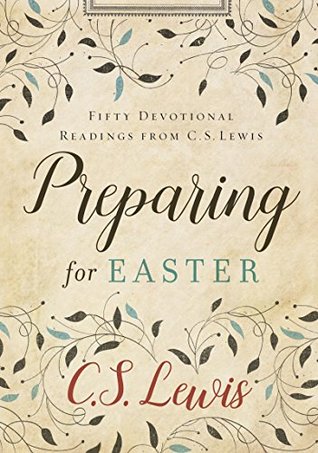- Bible
- Read the Bible
- Bible Versions
- Verse of the Day
- Reading Plans
- Verses by Topic
- Books of the Bible
- Bible Images
- Study
- Commentaries
- Concordances
- Dictionaries
- Encyclopedias
- Sermons
- Bible Atlas & Maps
- BP Wiki
- Devotionals
- Today's Devotionals
- Light of the World
- All Devotionals
- Inspirational Quotes
- More
- Picture Quotes
- Videos
- Inspirational
- Bible Study
- What The Bible Says
- Bible Q&As
- Daily Bread
- Bible by Genre
- Bible Stories
- Random Bible Verse
- Community
- Store
Together in one special volume, selections from the best of beloved bestselling author C. S. Lewis’s classic works for readers contemplating the "grand miracle" of Jesus’s resurrection.
Together in one special volume, selections from the best of beloved bestselling author C. S. Lewis’s classic works for readers contemplating the "grand miracle" of Jesus’s resurrection.Preparing for Easter is a concise, handy companion for the faithful of all Christian traditions and the curious to help them deepen their knowledge and consideration of this holy season—a time of reflection as we consider Jesus’s sacrifice and his joyous rise from the dead.
Preparing for EasterPreparing for Easter is a concise, handy companion for the faithful of all Christian traditions and the curious to help them deepen their knowledge and consideration of this holy season—a time of reflection as we consider Jesus’s sacrifice and his joyous rise from the dead.Carefully curated, each selection in Preparing for Easter draws on a major theme in Lewis’s writings on the Christian life, as well as others that consider why we can have confident faith in what happened on the cross.
Carefully curated, each selection in Preparing for EasterPreparing for Easter draws on a major theme in Lewis’s writings on the Christian life, as well as others that consider why we can have confident faith in what happened on the cross.BUY NOW
Kindle Edition, 216 pages
Published February 14th 2017 by HarperOne
© 2025 Bibleportal.com All rights reserved.

Clive Staples Lewis was born in Ireland, in Belfast on 29 November 1898. His mother was a devout Christian and made efforts to influence his beliefs. When she died in his early youth her influence waned and Lewis was subject to the musings and mutterings of his friends who were decidedly agnostic and atheistic. It would not be until later, in a moment of clear rationality that he first came to a belief in God and later became a Christian.
C. S. Lewis volunteered for the army in 1917 and was wounded in the trenches in World War I. After the war, he attended university at Oxford. Soon, he found himself on the faculty of Magdalen College where he taught Mediaeval and Renaissance English.
Throughout his academic career he wrote clearly on the topic of religion. His most famous works include the Screwtape Letters and the Chronicles of Narnia. The atmosphere at Oxford and Cambridge tended to skepticism. Lewis used this skepticism as a foil. He intelligently saw Christianity as a necessary fact that could be seen clearly in science.
"Surprised by Joy" is Lewis's autobiography chronicling his reluctant conversion from atheism to Christianity in 1931.
... Show more